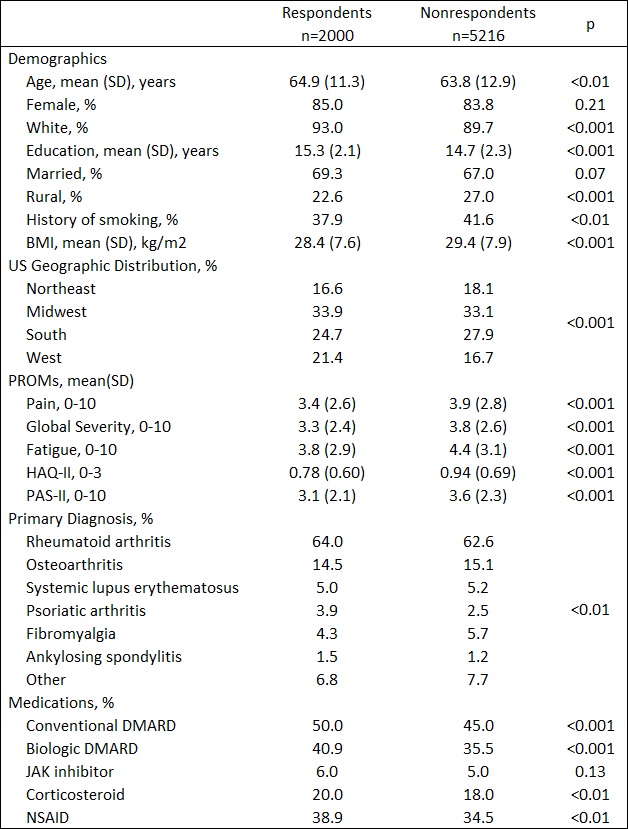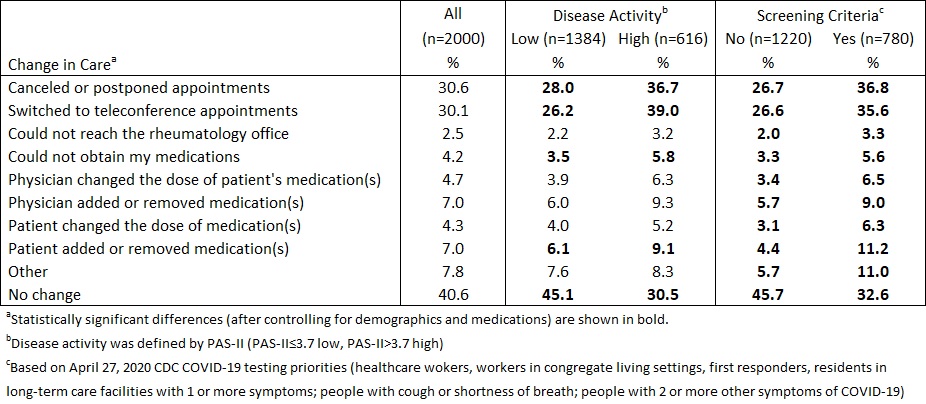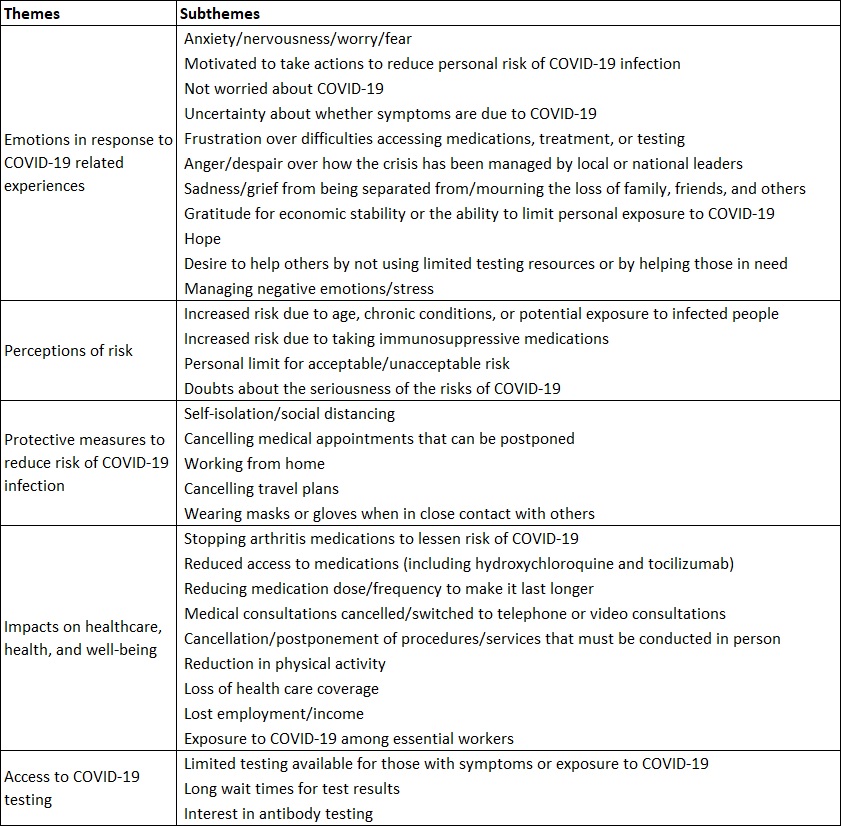Session Information
Date: Friday, November 6, 2020
Title: Epidemiology & Public Health Poster I: COVID-19 & Rheumatic Disease
Session Type: Poster Session A
Session Time: 9:00AM-11:00AM
Background/Purpose: Patients with rheumatic diseases such as RA and lupus have increased risk of infection and are treated with medications that may increase this risk yet are also hypothesized to help treat COVID-19. We expanded upon our previously published work on the early few weeks of the COVID-19 pandemic1 to the early few months to better understand how patients have been impacted.
Methods: Participants were enrolled in FORWARD, The National Databank for Rheumatic Diseases, a longitudinal registry of patients with rheumatic diseases. Participants with active email were invited to answer 5 COVID-19 surveys sent every 2 weeks from March 25 through June 2, 2020. Participants were asked about new symptoms, COVID-19 testing, changes in their rheumatology care, safety measures, social contact, economic impact, and more. Responses were linked to each participant’s most recently completed semiannual questionnaire for demographics, diagnosis, patient-reported outcome measures, and medication use. Student’s t tests, Χ2 tests, and logistic regression were used to assess significance (p< 0.05) as appropriate. Two of the authors (YS and TAS) independently read and open coded optional free text comments using a grounded theory approach and organized them into themes.
Results: A total of 7217 participants were invited, and 2000 (28%) responded to one or more COVID-19 questionnaires. RA was the most frequent diagnosis (63%). Geographic distribution was diverse, with respondents representing all 50 states. Respondents and non-respondents had slight demographic differences, and respondents had lower disease activity (Table 1). More than half (59%) of respondents experienced one or more changes in their rheumatology care due to COVID-19. Patients with higher disease activity or who met COVID-19 screening criteria were significantly more likely to experience a change in care (Table 2). Nearly all (99%) respondents reported taking safety measures to reduce risk, 6% received COVID-19 testing, 0.8% tested or were presumed positive, and 16% reported a negative economic impact. Qualitative analysis of the free text comments from 762 respondents revealed 5 key themes: emotions in response to the pandemic, perceptions of risk from immunosuppressive medications, protective measures to reduce risk, disruptions in accessing medications, and limited access to COVID-19 testing (Table 3).
Conclusion: In the first few months of the COVID-19 pandemic in the US, most patients with rheumatic diseases had important changes to their healthcare, with many changing medical appointments, altering medications with and without professional consultation, and unable to access prescriptions. Those with higher disease activity and those who met CDC priority testing criteria were significantly more likely to experience changes in their rheumatology care even after controlling for demographic and medication differences. The relatively low rate of positive COVID-19 tests may be due to reporting bias and future follow up will be necessary to identify changes in care for COVID-19-positive patients.
References
1. Michaud K et al. Experiences of Patients with Rheumatic Diseases in the US During Early Days of the COVID-19 Pandemic. ACR Open Rheumatol. 2020.
 Table 1. Characteristics of participants who were emailed the COVID-19 supplemental questionnaire by response status.
Table 1. Characteristics of participants who were emailed the COVID-19 supplemental questionnaire by response status.
 Table 2. Changes in rheumatology care during the COVID-19 pandemic reported March through May 2020.
Table 2. Changes in rheumatology care during the COVID-19 pandemic reported March through May 2020.
 Table 3. Themes and subthemes identified from COVID-19 questionnaire optional free response comments.
Table 3. Themes and subthemes identified from COVID-19 questionnaire optional free response comments.
To cite this abstract in AMA style:
Wipfler K, Shaw Y, Simon T, Cornish A, England B, Ogdie A, Katz P, Michaud K. Experiences of Patients with Rheumatic Diseases in the US During the Early Months of the COVID-19 Pandemic [abstract]. Arthritis Rheumatol. 2020; 72 (suppl 10). https://acrabstracts.org/abstract/experiences-of-patients-with-rheumatic-diseases-in-the-us-during-the-early-months-of-the-covid-19-pandemic/. Accessed .« Back to ACR Convergence 2020
ACR Meeting Abstracts - https://acrabstracts.org/abstract/experiences-of-patients-with-rheumatic-diseases-in-the-us-during-the-early-months-of-the-covid-19-pandemic/
